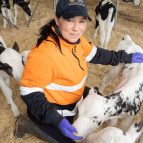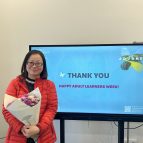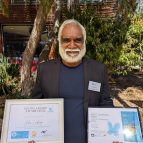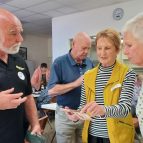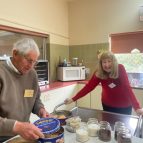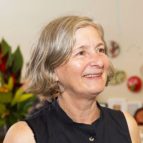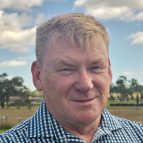Turning pages for literacy
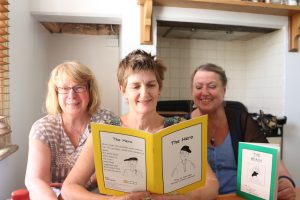
What do you get when three adult literacy tutors face the same problem? The solution. Almost 20 years ago tutors Anne Dunn, Chris Malakar, Moira Hanrahan with Preston Reservoir Adult Community Education (PRACE) launched PageTurners, a best selling series of books for adult literacy students.
Anne started hand making books in her adult literacy classes, using photos students brought in or printed off the Internet. She worked with students to write stories to accompany them. ‘I’d type them up, and make up copies and I’d put them in the book basket. An early one was a story by a woman called Stephanie about her baby nephew. It was really simple and told in her own words. She took copies for friends and relatives and I put half a dozen in the book basket for other students to borrow. Students were taking them home and not bringing them back. So I made another batch, put them in the basket, same thing. It was a bestseller.’
Their boss Libby Barker at PRACE seeing the popularity of the books suggested they make the books to sell to other adult literacy services and organised a small loan to get the project off the ground. With Anne and Chris as writers of the first series and their friend and fellow tutor Moira Hanrahan as illustrator, the PageTurner series was born.
‘We didn’t think it would make a profit, when we started we just hoped it would break even. We got a $1000 loan to set it all up and we paid that back pretty quickly.’ These days you’re as likely to come across PageTurners in libraries in America, Canada and New Zealand as you are in your own local library.
When did they realise that they had a hit on their hands? ‘I took a book into class fresh from the printers, called “I want a holiday.” And a student called Graham, an older guy saw the book and said, “I want one of those”. He started to read it aloud and the whole class went quiet. He just kept reading it and checking every word, and when he finished it everybody clapped and he said, “That’s the first book I’ve ever read!” It was just fantastic you know. We weren’t sure of the reception we’d get and he picked it up because he liked the topic, so that’s when we knew. I said to Chris and Moira, “Wow, they love it!” Anne says.
Each series of 10 books is divided into 4 levels of difficulty from the 100 word Level 1 stories to up to 600 word stories at Level 4. A full vocabulary is included at the back of the book as well as exercises to help students’ comprehension. ‘The questions and exercises in the back of each book are not just for students,’ Anne says. ‘We know from working in the ACE sector that tutors like us pretty much work alone. They teach in church halls, in factories, they come and go, with no desk or meeting place where they can catch up with other teachers. So the ideas in the back of the book are our way of giving adult literacy tutors some professional development in a laid back kind of way. Teachers can pick up the questions we pose in the back of the books and adapt them for different classes.’
‘We’ve been in profit every year since we started. We’re not exactly taking world cruises but in a good year we make as much as most other authors of Australian books,’ Anne Dunn.
Real life experiences in PageTurners
‘We wanted to provide books for beginner adult readers with stories that reflected their lives,’ Anne says. But there’s no “typical” adult literacy student so they’ve written stories to appeal to a broad range of people who want to improve their reading and writing.
‘They’re aimed at everyone from young ratbags who love motorbikes to older migrants who’ve worked in factories for 50 years and everyone in between,’ Anne says.
All three agree they’ve gotten better at it over time, although Moira points out that the simplicity of the books is deceptive. ‘They’re a real challenge to write,’ Moira who has since turned author as well as illustrator says. ‘I’ve never been able to crack a Level 1 story. It’s really hard to write something with a good punchline in so few words.’ Chris who says she’s always been a “closet writer” agrees, ‘Writing humour in a limited number of words is really tricky.’ Often they turn to their own lives and stories students tell them in class for inspiration.
‘One student came into class after a weekend and told us how she went to a beach and there was nobody there and it turned out to be a nude beach.’ Anne laughs. ‘That sounded like a perfect story idea! Then another student came back from a holiday with her family and when we asked her “How was your holiday?” she said “What holiday? Who had a holiday? I was cleaning and cooking the whole time!” One student who had just had his tongue pierced despite his mother’s warnings became fodder for a story, as did the couple in class who were planning a huge wedding that neither could afford. All of these experiences and stories ended up inside the covers of PageTurners. But their specificity doesn’t count against them, if anything their popularity overseas suggests that PageTurner stories tap into something universal. Perhaps because they take a lighthearted look at experiences of real people.
Planning ahead
The trio plan each series, identifying gaps, developing stories that they feel need telling. ‘We get together every so often for a planning meeting where we talk about who we are aiming at, what we need more of and at which level, as well as talking about the kinds of people we have in our classes and what stories might appeal to them. From that conversation, we come up with a list of story ideas and make a deadline for first drafts,’ Moira says.
‘For example we decided to do a series to introduce Australian culture and history to people without high levels of reading. So we wrote ones about Ned Kelly, the cameleers, fire, the goldfields, Cyclone Tracy. And we’ve had really good feedback on those,’ Anne says. ‘We also did some on things that come up every year in the news – Anzac Day, Cup Day, that sort of thing.’
‘It’s kind of an organic process that works,’ Chris says. ‘We have different writing styles, we all work on our stories and come together and give one another feedback. If we were all working on one story we’d probably kill each other.’ She laughs. ‘There’ve been plenty of tense moments over the years when it comes to critiquing work but Libby’s a good mediator, she brings out the best in us. She’s a great manager, she doesn’t micromanage, she just helps us get on with it,’ Chris says.
All three agree that the purpose of PageTurners is to entice and interest budding adult readers. ‘We keep them fun because we’re encouraging reading for pleasure,’ Anne says.
As for the future, things look bright. Literally. Their next series will be published with colour illustrations. Moira says ‘Back at the start I just quickly scribbled the drawings because I thought we’d just be using them in our classes. I had a kind of ‘that’ll do’ approach. But my drawings have improved a lot since then. I’ve gotten a lot neater, and I’ve got more technical skill. I’ve always loved drawing I’ve done it all my life. Now that I’m retired I can put more time into it and I’m much more painstaking. It takes me back to my childhood, sitting around drawing all day.’
With series 8 finished and 67 stories complete, the three have plenty of ideas for more. ‘We laugh about doing it in our nursing homes and on our deathbeds,’ Chris says. ‘Yes.’ Anne laughs. ‘We’ve talked about what will happen when we die but haven’t come up with a plan – yet.’
‘One book really touched my heart. It’s about a lady who is learning to write and read who was scared to go to class and mix with other people. When I read it I felt it was like me, it was my story.’ Louisa, PRACE student.
Students’ views of PageTurners
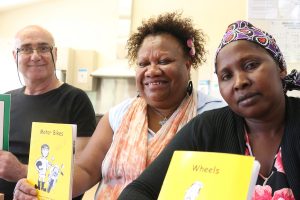 Mahir, Louisa, Ahmal and Dikea are students in Chris Malakar’s EAL class at PRACE. Louisa never went to school in her native PNG and has only recently learned to read. She’s a big fan of PageTurners. One of her favourites is about a robot that can do the shopping, clean the bathroom and mow the lawn. Another is a story about a woman who takes a reading and writing class and Louisa loved the story because she identified closely with it.
Mahir, Louisa, Ahmal and Dikea are students in Chris Malakar’s EAL class at PRACE. Louisa never went to school in her native PNG and has only recently learned to read. She’s a big fan of PageTurners. One of her favourites is about a robot that can do the shopping, clean the bathroom and mow the lawn. Another is a story about a woman who takes a reading and writing class and Louisa loved the story because she identified closely with it.
‘Before I felt shy and ashamed because I couldn’t speak good English and I couldn’t mix properly. But now I can travel on the train, take the bus, go to church and I feel happy. Now I can go to the shops and the doctor by myself and I can talk in a way I couldn’t before. These books and my teacher Chris give me confidence.’
Mahir says, ‘My English is OK for reading but bad for writing. English is very tricky, the reading and writing are very different. I like the stories. I am reading now about 1960 and Neil Armstrong landing on the moon and the Sydney Harbour bridge. Every book is different. Some are easy with just five pages, some are 12 pages. I’ve read two a week since I started last term, so that is 24 books so far. Some of the books are funny, some are sad. I feel good at how much better I am now than before.’
Dikea spent the last 38 years working long hours as a pieceworker, taking few holidays and breaks. ‘Before I had no time to learn English. So this is my time to learn. I like all the PageTurner books. You learn with these books. We read them, we talk about them, then we write. We learn from one another’s stories too. Each person has their own story. Coming here it feels like my house. They are all very happy people in our class.’
See the full issue of Quest 1, 2018
https://pageturners.prace.vic.edu.au/

